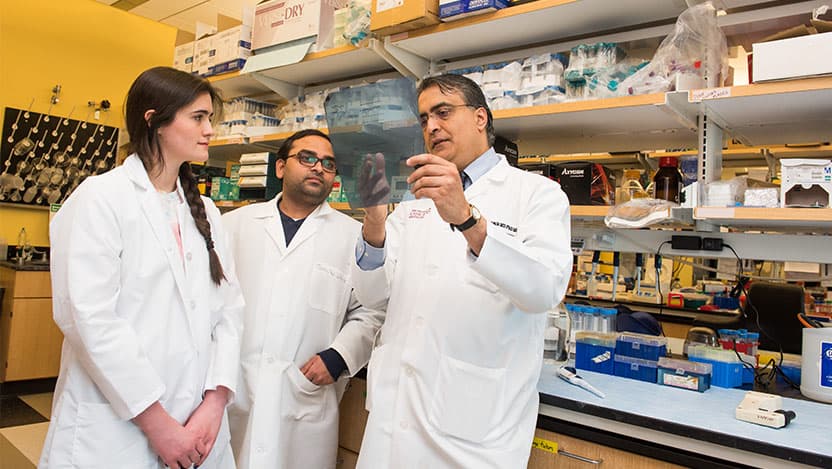Personalized combination treatment turns on an immunometabolic switch to effectively control an aggressive form of prostate cancer

Researchers at the University of Chicago Medicine Comprehensive Cancer Center established “proof-of-concept” for a new treatment approach that was able to effectively treat a mouse model of the most aggressive forms of prostate cancer. The treatment showed complete tumor control and long-lasting survival without side effects in a mouse model of advanced prostate cancer.
These findings, published online September 18, 2023 in Akash Patnaik, MD, PhD, MMSc, an internationally recognized expert in prostate cancer research and treatment who is the senior author of the publication. “Although this form of treatment has been shown to have significant anti-cancer responses in patients, the majority will become resistant to hormonal therapy, or castrate-resistant.”
Advanced prostate cancers that don’t respond to standard hormone-based therapy, chemotherapy or immunotherapy leave patients with very few options. Researchers are working to develop urgently needed treatments for these aggressive cancers, collectively known as metastatic castration-resistant prostate cancer (mCRPC).
Patnaik’s lab developed targeted strategies to improve the responsiveness of prostate cancer to immunotherapy. They discovered that the immune system often promotes cancer growth — instead of suppressing it — through recruitment of abnormal tumor-associated macrophages that express PD-1 (a checkpoint molecule that turns off an anti-cancer immune response) into the tumor microenvironment.
In a previous study published in March 2023, Patnaik and colleagues found that co-targeting the PI3K and PD-1 pathways enhanced the antitumor effects of hormone therapy in PTEN-deficient prostate cancer, an aggressive form of advanced prostate cancer that results from the loss of a gene that keeps cell growth in check.
However, they observed that 40% of mice in the study remained resistant to the therapy. Follow-up experiments revealed that activation of the Wnt/β-catenin pathway restored lactate production in treatment-resistant cancers. The researchers discovered that lactate can crosstalk with macrophages and modify them via a process called histone lactylation. This change makes the macrophages immunosuppressive, so they promote the growth of the cancer.
A paradigm shift
In the current study, Patnaik's team reported that resistance to PI3K inhibitors is mediated by Wnt/β-catenin and MEK signaling pathways. They altered their approach to co-target PI3Ki/MEK signaling pathways, which resulted in an 80% response rate. Similar to their previous studies, they observed that the non-responders had a feedback activation of Wnt/β-catenin signaling.
They then tested a therapy regimen that consisted of three drugs targeting the PI3K, MEK and Wnt/β-catenin signaling pathways. This approach brought the response rate to 100%.
“We were concerned about toxicity with continuous drug administration over the long-term, as is often the case with drug combinations in patients, so we did survival studies in mice with intermittent dosing of the same three drugs,” Patnaik said.
The researchers were excited to see that the intermittent dosing schedule resulted in complete tumor control and significantly prolonged survival — without long-term toxicity associated with continuous drug administration.
Patnaik says collectively, their findings provided “proof-of-concept” that targeting lactate controls the growth of PTEN/p53-deficient prostate cancer and warrants further investigation in clinical trials.
Moreover, the idea that the drugs could perturb signaling pathways in the cancer cells that affect the metabolic output of the cancer cell and cross-talk with tumor-promoting macrophages unveils new therapeutic opportunities that have not been previously pursued.
“We don't necessarily need to use targeted therapies to kill cancer cells but instead harness their ability to flip the switch in macrophages,” Patnaik said. “Now the macrophages can eat the cancer cells and control the cancer.”
Patnaik said the next step in this research would be testing this concept in the clinic: “We would develop a phase 1 clinical trial looking at testing an intermittent dosing approach to see if we can achieve a similar immune-activating and anti-tumor response as we've seen in our mouse model.”
In a Suppression of tumor cell lactate-generating signaling pathways eradicated murine PTEN/p53-deficient aggressive-variant prostate cancer via macrophage phagocytosis,” was supported by funding from the Prostate Cancer Foundation Izzy Englander Challenge Award and the National Cancer Institute.
Additional authors include Kiranj Chaudagar, Hanna M. Hieromnimon, Anne Kelley, Brian Labadie, Jordan Shafran, Srikrishnan Rameshbabu, Catherine Drovetsky, Kaela Bynoe, Ani Solanki, Erica Markiewicz and Xiaobing Fan from Akash Patnaik’s team at the University of Chicago and collaborator Massimo Loda from Weill Cornell Medicine.

Akash Patnaik, MD, PhD, MMSc
Akash Patnaik, MD, PhD, MMSc, is a medical oncologist specializing in the care of patients with genitourinary cancers, including prostate, bladder, kidney and testicular cancers. He also has a strong interest in the development of novel therapeutics for treatment of advanced solid tumors.
Read Dr. Patnaik's physician bio
Prostate Cancer Care
The UChicago Medicine prostate cancer care team is highly skilled in the most up-to-date, technologically advanced methods for the diagnosis and treatment of prostate cancer. We offer the full range of treatment options, including robotic surgery, clinical trials of new therapies, sophisticated radiation oncology care, genetic testing for hereditary risk factors and more.
Prostate Cancer Care Services